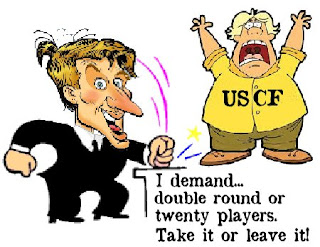Robert Fischer won the U.S. Championship for the eighth and last time in 1966 and after that he refused to play in any more championships.
His losses to Edmar Mednis in 1963 and to Samuel Reshevsky and Robert Byrne in the 1965 championship had left him fretful. After the loss to Mednis the idea occurred to him that the tournaments were too chancy because one bad game and he could lose his title. In his words, "Something [is] really wrong if a fellow couldn't lose a game in a US championship without practically being eliminated."
So, in the fall of 1966 he laid down the law: The championship would have to be enlarged to make it a double-round event or it would be lengthened by adding another eight or more players. That would be a fair fight like the Soviet championship, he said.
USCF officials couldn't understand how Fischer, who had won 53 games out of 79 (an 82 percent winning record) could have such doubts about his ability. Even in the 1965 Championship where he lost an unprecedented two games and was held to a draw by William Addison, Fischer had mowed down Bernard Zuckerman, Nicolas Rossolimo, Pal Benko, Larry Evans, Anthony Saidy, Arthur Bisguier, Karl Burger and Duncan Suttles to win the title by a full point.
In the months before the 1966 Championship Fischer was silent, but then in a long distance phone call from Mexico City to the USCF, Fischer presented his demands. The 1966 Championship had to be 16 rounds or he wouldn't play.
Enter Maurice J. Kasper. Kasper (1900-1972) was a wealthy man who made his fortune in the textile business and financed many events, including the Manhattan Chess Club where he was President for many years, offered Fischer a promise to work towards a longer tournament next year, but there just wasn't enough time this year. He also sweetened the pot by offering Fischer an extra $500 for showing up this time. Fischer relented and arrived from Mexico just a few days before the first round.
This turned out to be his last appearance in the US Championship. When the 1968 tournament rolled around Fischer didn't even respond to his invitation. The tournament was to be a 12-player event, not 16, and Fischer wouldn't even consider it. Longtime friend Larry Evans said he tried to get him to play, but Fischer was adamant.
Instead, he chose to play in a 16-player tournament in Netanya, Israel. Besides Fischer, the notable players included were Daniel Yanofsky from Canada, Hans Ree from the Netherlands, and Victor Ciocaltea from Romania, two of Israel's strongest players, Yair Kraidman and Moshe Czerniak. At the time, Fischer was active in the World Wide Church of God and was observing the Jewish Sabbath which, of course, presented no problems in Israel. Fischer blew away the competition and finished undefeated with ten wins and three draws, three and a half points ahead of Yanofsky and Czerniak who shared second.
Returning to the 1966 tournament. Besides Fischer, the line up included six strong GMs (Evans, Reshevsky, Robert Byrne, Lombardy, Benko and Bisguier). Of the others, Rossolimo had not played much since the 1950s, but was still good enough that on any given day he was capable of defeating anyone as were Anthony Saidy and Bernard Zuckerman. Donald Byrne was strong, but rusty from lack of practice while the remaining two, James T. Sherwin and William Addison, were there based on their ratings. Addison was later to qualify for the 1970 Interzonal at Palma de Mallorca, where he finished in a lowly 18th place.
In this last championship Fischer was nicked for draws by Evans, Addison and Robert Byrne and finished first by two full points. But, when he reiterated his preposterous demand that the next championship either be a double round affair or consist of twenty players and his demand wasn't met, he refused to play in any more US Championships.
1) Fischer 9.5
2) Evans 7.5
3-4) Benko and Sherwin 6.0
5) Bisguier 5.5
6-7) Addison and Saidy 5.0
8-10) R. Byrne, Reshevsky and Rossolimo 4.5
11-12) D. Byrne and Zuckerman 4.0


Fischer made legitimate and sensible requests. Remember, his IQ was around 181; so he saw things most of us didn't. He knew the Russians were cheating (playing short draws, etc to conserve energy) and conspiring against him for years, and dodging him, so more requests/demands to make tournaments more fair. Double eliminations or the like are very reasonable and more in tune with letting who's best rise to the top.
ReplyDelete